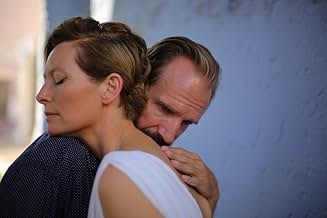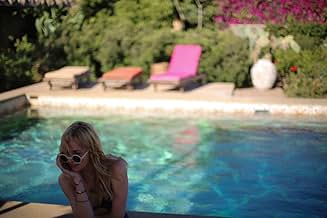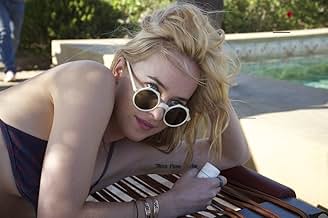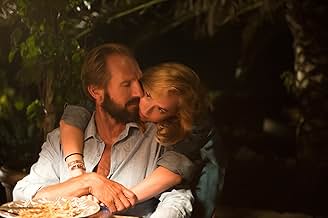Der Urlaub eines Filmemachers und seiner Freundin, dem Rockstar Marianne, wird durch den unerwarteten Besuch ihres alten Freundes Harry und seiner Tochter gestört.Der Urlaub eines Filmemachers und seiner Freundin, dem Rockstar Marianne, wird durch den unerwarteten Besuch ihres alten Freundes Harry und seiner Tochter gestört.Der Urlaub eines Filmemachers und seiner Freundin, dem Rockstar Marianne, wird durch den unerwarteten Besuch ihres alten Freundes Harry und seiner Tochter gestört.
- Auszeichnungen
- 4 Gewinne & 19 Nominierungen insgesamt
Empfohlene Bewertungen
World famous singer Marianne Lane (Swinton), temporarily mute from a recent throat operation, is enjoying a relaxing holiday with her doting film-maker boyfriend Paul De Smedt (Schoenaerts) on a remote idyllic Italian island. Much to their initial annoyance, Lane's manic music producer and ex-boyfriend Harry Hawkes (Fiennes) turns up with his newly discovered daughter Penelope (Johnson) to gate- crash the tranquillity.
A Bigger Splash is a character development masterclass by Guadagnino. Over the first hour, the film gives everything to build up the intricacies of each character's attributes so that every subsequent variation and elaboration feels exhilarating. This is a film about people and relationships; how different associations can sometimes coalesce yet at other times grate, how secrets and history must awkwardly co-exist with the fantasies of perfection.
Fiennes is simply superb. He absolutely nails Hawkes extrovert nature, perfectly mixing it with the selfish dark underbelly which success invariably requires. Swinton marvellously continues to build her rapidly emerging reputation with a multifaceted character that says less than a hundred words throughout the entire running time. Both Schoenaerts and Johnson are solid but are unluckily eclipsed by Fiennes and Swinton's sparkle. In fact, such is Fiennes utter dominance early on, there feels a distinct possibility he will overshadow not only the other actors, but the film itself. Fortunately, as time passes the rest of the cast get their chance in the sun and, to their credit, pull it back just before it becomes the Ralph Fiennes Show.
The friction between De Smedt and Hawkes is always at the forefront; the protective grounded boyfriend against the vociferous music producer ex. Hawkes tempts Lane to speak at the dinner table, De Smedt knocks him back, Hawkes dances to a track he produced for the Rolling Stones, De Smedt pulls Lane closer on the sofa. It's the subtle fragments of both loving and sexual tension which keep the flow of A Bigger Splash so thrilling.
When the plot eventually makes its move, sides are taken, suspicions are rife, relationships are both strained and solidified. Only then do you realise just how well the film has branded its characters into your hide, and how desperate you are to know the outcome.
Until the last half hour or so not much really happens in A Bigger Splash but you simply don't notice, such is the utter delight in watching a great cast develop complex characters with a wonderfully astute script.
A Bigger Splash is a character development masterclass by Guadagnino. Over the first hour, the film gives everything to build up the intricacies of each character's attributes so that every subsequent variation and elaboration feels exhilarating. This is a film about people and relationships; how different associations can sometimes coalesce yet at other times grate, how secrets and history must awkwardly co-exist with the fantasies of perfection.
Fiennes is simply superb. He absolutely nails Hawkes extrovert nature, perfectly mixing it with the selfish dark underbelly which success invariably requires. Swinton marvellously continues to build her rapidly emerging reputation with a multifaceted character that says less than a hundred words throughout the entire running time. Both Schoenaerts and Johnson are solid but are unluckily eclipsed by Fiennes and Swinton's sparkle. In fact, such is Fiennes utter dominance early on, there feels a distinct possibility he will overshadow not only the other actors, but the film itself. Fortunately, as time passes the rest of the cast get their chance in the sun and, to their credit, pull it back just before it becomes the Ralph Fiennes Show.
The friction between De Smedt and Hawkes is always at the forefront; the protective grounded boyfriend against the vociferous music producer ex. Hawkes tempts Lane to speak at the dinner table, De Smedt knocks him back, Hawkes dances to a track he produced for the Rolling Stones, De Smedt pulls Lane closer on the sofa. It's the subtle fragments of both loving and sexual tension which keep the flow of A Bigger Splash so thrilling.
When the plot eventually makes its move, sides are taken, suspicions are rife, relationships are both strained and solidified. Only then do you realise just how well the film has branded its characters into your hide, and how desperate you are to know the outcome.
Until the last half hour or so not much really happens in A Bigger Splash but you simply don't notice, such is the utter delight in watching a great cast develop complex characters with a wonderfully astute script.
'A Bigger Splash' (2015) is a remake of a film ('La Piscine' - directed by Jacques Deray based on a novel by Alain Page) that is remembered today mainly because of the presence on the screen of the couple Alain Delon - Romy Schneider. Since then, a few more films have been added to the 'swimming pool drama' genre. The version created by the Italian director Luca Guadagnino is different in that it does not completely isolate the sentimental conflicts of the characters and the blue waters of the pool from the world around. We are in the years when the crisis of migrants making their way across the Mediterranean was at its peak. The Italian island where the story is set is in the middle of this tumult, which will also influence, despite them, the destinies of the characters.
Marianne is a famous rock singer who is recovering from a throat surgery that may damage her vocal cords, due to which doctors have advised her not to use her voice for a while. Together with Paul, her boyfriend, a documentary films director, they chose the villa on this island to isolate themselves from the world. Their plan is upended when Harry, a hysterical extroverted music producer, shows up, accompanied by his young beauty daughter Penelope. Harry is Paul's best friend and Marianne's ex-lover. He seems uncaring and morally corrupt, willing to drag everyone else around him into his self-centered machinations. The attempt to renew the connection with Marianne is at first met with a refusal, but the man insists. Meanwhile, some kind of relationship seems to be forming between Paul and Penelope. But something will happen and the erotic drama is in danger of sliding towards tragedy.
The screenplay is a bit unbalanced, in the sense that more than half of the film we witness the far too thorough and too patient construction of a drama that unfolds too late. With less than half the time available, the second part, which had become interesting, seems to be headed for an ending that some found problematic (not me). The cast is stellar. Tilda Swinton has a very interesting role precisely because she is limited in her ability to speak. A professional of voice, both in the story in the film and as an actress, she is obliged to use solely the expressiveness of her figure and body and succeeds in creating a memorable role. Ralph Fiennes thickens Harry's features a bit, but in the end his character is credible and interacts well with his partners. Matthias Schoenaerts is a bit too low-key as Paul. Maybe it was the directorial indications, but my feeling was that the character played by him is not fully revealed. Rounding out the cast is Dakota Johnson as Penelope. She also leaves some open questions about her character, but here the mystery is clearly intentional and belongs in the script. I also liked the cinematography created by Yorick Le Saux - spectacular, but without stepping into the realm of tourist ads. On the contrary, the camera manages to capture glimpses of the real world, indifferent to the conflicts that take place in the villas of the rich and too busy with the real dramas to care about the possible dramas that take place in or around the swimming pools.
Marianne is a famous rock singer who is recovering from a throat surgery that may damage her vocal cords, due to which doctors have advised her not to use her voice for a while. Together with Paul, her boyfriend, a documentary films director, they chose the villa on this island to isolate themselves from the world. Their plan is upended when Harry, a hysterical extroverted music producer, shows up, accompanied by his young beauty daughter Penelope. Harry is Paul's best friend and Marianne's ex-lover. He seems uncaring and morally corrupt, willing to drag everyone else around him into his self-centered machinations. The attempt to renew the connection with Marianne is at first met with a refusal, but the man insists. Meanwhile, some kind of relationship seems to be forming between Paul and Penelope. But something will happen and the erotic drama is in danger of sliding towards tragedy.
The screenplay is a bit unbalanced, in the sense that more than half of the film we witness the far too thorough and too patient construction of a drama that unfolds too late. With less than half the time available, the second part, which had become interesting, seems to be headed for an ending that some found problematic (not me). The cast is stellar. Tilda Swinton has a very interesting role precisely because she is limited in her ability to speak. A professional of voice, both in the story in the film and as an actress, she is obliged to use solely the expressiveness of her figure and body and succeeds in creating a memorable role. Ralph Fiennes thickens Harry's features a bit, but in the end his character is credible and interacts well with his partners. Matthias Schoenaerts is a bit too low-key as Paul. Maybe it was the directorial indications, but my feeling was that the character played by him is not fully revealed. Rounding out the cast is Dakota Johnson as Penelope. She also leaves some open questions about her character, but here the mystery is clearly intentional and belongs in the script. I also liked the cinematography created by Yorick Le Saux - spectacular, but without stepping into the realm of tourist ads. On the contrary, the camera manages to capture glimpses of the real world, indifferent to the conflicts that take place in the villas of the rich and too busy with the real dramas to care about the possible dramas that take place in or around the swimming pools.
There's something that made this film really come together well in the beginning. I didn't think it entirely successful, and many people will not take to its meandering tone and feel. More importantly, the character beats all seemed to work well. Yet at the same time, the longer it went on, the more and more I disliked it. The longer it went on, the more obnoxious it became, and what was initially interesting and intriguing became really lazy and uninspired. The more original the film thought it was, the more aggravating it was. I can't even really pick any specifics, it just did not sit right with me. The cast itself was good, and the film definitely wasn't following any clichés or formulas, so perhaps I would feel like rewatching it in the future and that would change my mind. But oh no, not right now.
The getaway-retreat scenario is a common film device for creating a chaotic crossroad where divergent character types can bring their shady pasts, chronic problems and deviant desires. It works well in the melodrama genre because people act differently when brought together, especially in a luxurious or exotic location where they can let go and be who they really are: recent examples include Youth (2015) and The Grand Budapest Hotel (2014). A Bigger Splash (2016) does this using a beautiful Sicilian hillside villa with a prominent pool for baring bodies and souls. To keep the plot line taut there are only four actors who play out in two pairs and the chemistry is anything but harmonious.
An almost silent Marianne (played by Tilda Swinton) is a once-famous rock star who is recuperating from throat surgery with her former alcoholic boyfriend Paul (Matthias Schoenaerts). They couple happily all over the villa until her extroverted and still-hungry former flame Harry (Ralph Fiennes) suddenly turns up with his sullen and sultry teenage daughter Penelope (Dakota Johnson). The tension lines appear quickly and the dynamics morph seamlessly towards an erotic thriller. Harry and daughter are overly physical with each other, Paul is derailed by the teenager's libido, Marianne dabbles with forbidden fruit, while the men circle each other with malice. Harry's use of his daughter as bait turns out to make him the catch while the beautifully photographed Sicilian landscape dwarfs four small lives and the mess they create.
All of the actors deserve accolades but Fiennes stands out for his ability to plausibly and expressively switch from manic exuberance to emotional vulnerability. He drives the story forward both narratively and as its primary entertainer. Swinton and Johnson are perfect for their respective positions on the femme fatale spectrum, and Schoenaerts captures what many will say is the most complex role of this story. With fine acting, classic landscape photography, a great soundtrack, and an engaging story to tell, one would expect that the whole would be greater than the sum of its parts. But this circular tale simply leads back to where it starts and leaves a vague feeling they have not gone far. As with so many films, it will be judged on its final moments.
An almost silent Marianne (played by Tilda Swinton) is a once-famous rock star who is recuperating from throat surgery with her former alcoholic boyfriend Paul (Matthias Schoenaerts). They couple happily all over the villa until her extroverted and still-hungry former flame Harry (Ralph Fiennes) suddenly turns up with his sullen and sultry teenage daughter Penelope (Dakota Johnson). The tension lines appear quickly and the dynamics morph seamlessly towards an erotic thriller. Harry and daughter are overly physical with each other, Paul is derailed by the teenager's libido, Marianne dabbles with forbidden fruit, while the men circle each other with malice. Harry's use of his daughter as bait turns out to make him the catch while the beautifully photographed Sicilian landscape dwarfs four small lives and the mess they create.
All of the actors deserve accolades but Fiennes stands out for his ability to plausibly and expressively switch from manic exuberance to emotional vulnerability. He drives the story forward both narratively and as its primary entertainer. Swinton and Johnson are perfect for their respective positions on the femme fatale spectrum, and Schoenaerts captures what many will say is the most complex role of this story. With fine acting, classic landscape photography, a great soundtrack, and an engaging story to tell, one would expect that the whole would be greater than the sum of its parts. But this circular tale simply leads back to where it starts and leaves a vague feeling they have not gone far. As with so many films, it will be judged on its final moments.
The director's prior "I Am Love" ultimately transcended its more pretentious, arbitrary aspects with a certain feeling of epic emotionality. But this time around there isn't enough substance or originality in other departments to detract attention from how...well, pretentious and arbitrary many of his directorial choices are. To an extent there's interest in simply watching the well-cast stars go through their paces: Fiennes plays one of his most extroverted characters; Swinton has magnetism as usual in a contrasting figure (contrasting because her rock-star has to be silent while recovering from surgery--but a laughable flashback where she sings in a recording studio blows any belief that we're watching a credible musical talent); Schoenaerts is attractive and earnest; Johnson is good playing a petulant brat who uses her sexual allure in obvious (yet successful) ways. If you've ever wanted to see any of these actors full-frontal, here's your big chance, since there's a lot of nudity here that doesn't seem to exist for much reason beyond producing a "Look, s/he's taken it all off, too!" reaction.
But after a while you realize that as colorfully played as these figures are, none of them are drawn with enough depth to be genuinely interesting, and in fact they're largely annoying--to each other, and to us. It's predictable that the 2nd, vaguely incestuous "couple" who make an invasive surprise visit are going to disrupt the idyll and emotional security of the main couple who have hoped to escape just such company. It's predictable that there will be infidelity, and that sooner or later something violent is going to happen. Yet it's very hard to care about any of this.
That the director thinks his actors/characters are endlessly fascinating is obvious--otherwise why on Earth would he stage scenes like the one in which two of them invade a karaoke bar, and though neither of them can sing very well, we're supposed to believe they quickly have half the island populace raptly watching their performance? Judging from "I Am Love" and this, I've got to assume the director himself is a product of jet-setting wealth who automatically assumes the wealthy and privileged are special, fascinating creatures. Yet "Bigger Splash" inadvertently provides the truthful end to that sentence: "...only to each other."
In terms of image and editing, the film is flashy in often pointless, mannered ways that to my mind are neither beautiful or interesting...just show-offy and empty, the flourishes of a director who thinks flamboyant stylistic gestures = a true "artist," without worrying what they actually MEAN, if anything. (He's made a documentary about Bertolucci, and while the latter has certainly made some uneven, mannered work, he comes by instinctively everything that Guadagnino does in an imitative, pretentious way.) Of course, some will be taken in by it, since some people will always fall for Art that labels itself as such.
For all the talent it deploys, though, "Bigger Splash" is ultimately just a particularly pretentious variation on "erotic thriller" material, without much real tension, and certainly without any real substance. It's not terrible, but it's ultimately pretty trivial.
By the way, if you want a laugh, read Luca Guadagnino's Wikipedia bio. It's one of those Wiki entries that sounds like it was written by the subject (and/or his publicist), as it solemnly gushes over his "curiosity and passion for diverse artistic disciplines" including the company he founded that "conceives and implements luxury communications for luxury brands." I didn't know about THAT before, but it sure isn't surprising that he'd have a background in high-end advertising, the center of the universe for pretentious stylistic gestures about nothing.
But after a while you realize that as colorfully played as these figures are, none of them are drawn with enough depth to be genuinely interesting, and in fact they're largely annoying--to each other, and to us. It's predictable that the 2nd, vaguely incestuous "couple" who make an invasive surprise visit are going to disrupt the idyll and emotional security of the main couple who have hoped to escape just such company. It's predictable that there will be infidelity, and that sooner or later something violent is going to happen. Yet it's very hard to care about any of this.
That the director thinks his actors/characters are endlessly fascinating is obvious--otherwise why on Earth would he stage scenes like the one in which two of them invade a karaoke bar, and though neither of them can sing very well, we're supposed to believe they quickly have half the island populace raptly watching their performance? Judging from "I Am Love" and this, I've got to assume the director himself is a product of jet-setting wealth who automatically assumes the wealthy and privileged are special, fascinating creatures. Yet "Bigger Splash" inadvertently provides the truthful end to that sentence: "...only to each other."
In terms of image and editing, the film is flashy in often pointless, mannered ways that to my mind are neither beautiful or interesting...just show-offy and empty, the flourishes of a director who thinks flamboyant stylistic gestures = a true "artist," without worrying what they actually MEAN, if anything. (He's made a documentary about Bertolucci, and while the latter has certainly made some uneven, mannered work, he comes by instinctively everything that Guadagnino does in an imitative, pretentious way.) Of course, some will be taken in by it, since some people will always fall for Art that labels itself as such.
For all the talent it deploys, though, "Bigger Splash" is ultimately just a particularly pretentious variation on "erotic thriller" material, without much real tension, and certainly without any real substance. It's not terrible, but it's ultimately pretty trivial.
By the way, if you want a laugh, read Luca Guadagnino's Wikipedia bio. It's one of those Wiki entries that sounds like it was written by the subject (and/or his publicist), as it solemnly gushes over his "curiosity and passion for diverse artistic disciplines" including the company he founded that "conceives and implements luxury communications for luxury brands." I didn't know about THAT before, but it sure isn't surprising that he'd have a background in high-end advertising, the center of the universe for pretentious stylistic gestures about nothing.
Director's Trademarks: The Films of Luca Guadagnino
Director's Trademarks: The Films of Luca Guadagnino
Suspiria director Luca Guadagnino takes IMDb through his approach to filmmaking, from longtime collaborator Tilda Swinton, to why he hopes he doesn't have a "style."
Wusstest du schon
- WissenswertesMarianne Lane's concert scene was filmed in Milan, at the San Siro Stadium, home to Serie A football clubs Inter and AC Milan. They shot the scene in front of 70,000 people during the show of Italian Rock star Lorenzo Jovanotti. Tilda Swinton has a mutual friend with Jovanotti, so they asked him if he could lend his crown for 15 minutes and the audience was asked to shout "Marianne Lane" before Jovanotti came out.
- PatzerHarry says he was 16 when "Emotional Rescue" was released, but that album was released in June 1980 and Harry's passport birth date is in August 1961, so he was nearly 19 when that album came out.
The possible root of this error may be that the actor (Ralph Fiennes) was aware that he's portraying a character who is about to turn 50 years old, but for some reason didn't consider that the movie takes place in the summer of 2011 (instead of 2014, when the movie was filmed). He either forgot, or miscalculated, or the movie setting was changed from 2014 to 2011 by a script rewrite after this scene was already filmed.
- Zitate
Paul De Smedt: You're obscene.
Harry Hawkes: We're all obscene. Everyone's obscene. That's the whole fucking point. We see it and we love each other anyway.
- Crazy CreditsThroughout the credits, and at random intervals, there are images of stylised flowers, particularly noticeable in the section listing soundtrack items.
- Alternative VersionenA recut extended version of the film, running 195 minutes and re-titled An Even Bigger Splash, screened at the Gothenburg Film Festival on 5 February 2022.
- SoundtracksObservatory Crest
Written by Elliot Ingber, Don Van Vliet
Performed by Don Van Vliet (as Captain Beefhart)
Published by Honeysuckle Music Inc. / BMG VM Music Ltd.
Edizioni per Italia: BMG RIghts Management (Italy) Srl
(p) Island Records / Virgin Records Ltd
By arrangement with Universal Music Italia Srl
Top-Auswahl
Melde dich zum Bewerten an und greife auf die Watchlist für personalisierte Empfehlungen zu.
- How long is A Bigger Splash?Powered by Alexa
- What is the song in the trailer?
Details
- Erscheinungsdatum
- Herkunftsländer
- Offizielle Standorte
- Sprachen
- Auch bekannt als
- Великий сплеск
- Drehorte
- Produktionsfirmen
- Weitere beteiligte Unternehmen bei IMDbPro anzeigen
Box Office
- Bruttoertrag in den USA und Kanada
- 2.024.099 $
- Eröffnungswochenende in den USA und in Kanada
- 114.419 $
- 8. Mai 2016
- Weltweiter Bruttoertrag
- 7.547.068 $
- Laufzeit2 Stunden 5 Minuten
- Farbe
- Sound-Mix
- Seitenverhältnis
- 1.85 : 1
Zu dieser Seite beitragen
Bearbeitung vorschlagen oder fehlenden Inhalt hinzufügen


































